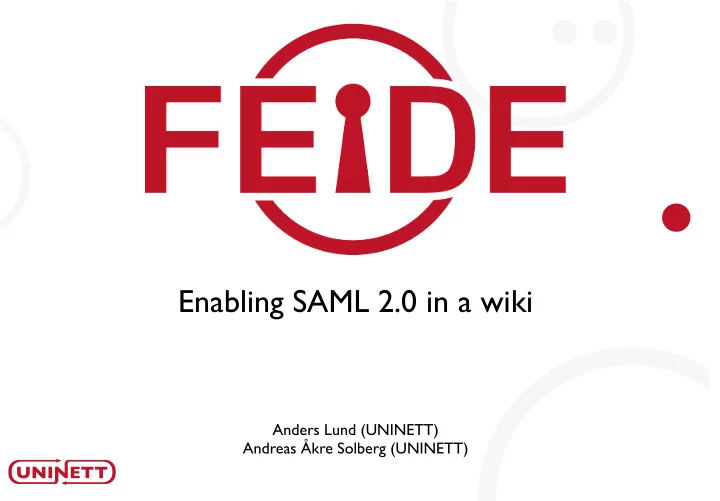

Enabling SAML 2.0 in a wiki Anders Lund (UNINETT) Andreas Åkre Solberg (UNINETT)
Software used - Dokuwiki http://wiki.splitbrain.org/wiki:dokuwiki - OpenSSO PHP Extension (lightbulb) https://lightbulb.dev.java.net/
Dokuwiki Pluggable authentication modules Supports ACL lists, and is using groups for authorization.
OpenSSO PHP A pure PHP5 implementation of a SAML 2.0 SP . Extremely simple installation and configuration. Implemented as proof of concept. Not feature-rich. Opensourced from Sun, modified by Feide.
OpenSSO Metadata Feide Meta data Service Meta data OpenSSO meta data is in a simple format, less verbose than standard SAML 2.0 meta data format. Most inportantly: endpoints urls, entity id and cert.-info.
Loading Metadata at Feide SAML 2.0 Meta data for service Contains the same info in standard SAML 2.0 meta data format.
Implementing an authentication module A dokuwiki authentication module identifies whether the user is logged in or not and returns either true or false . If true it accociates the authenticated user with a list of groups the user is member of, and also sets a username and a mail address.
Implementing an authentication module Load OpenSSOphp in the authmodule: Set the OpenSSO SSOinit and logout URL in a variable
Implementing an authentication module Redirect to OpenSSO SSOinit URL if local session cookie does not exist. When a user does not have a local session at the service, she is redirected to the Feide IdP with SAML 2.0 authentication request (this is done by OpenSSO php). After successfull authentication the user is sent back to OpenSSO php with a response, and the OpenSSO php library will set a session cookie for you. When a user is authenticated, you can get a userid through a OpenSSO method:
Dynamic group membership Retrieve attributes from OpenSSO php Generate dynamic group membership based on attributes: In addition add personal group memberships from a file:
Returning from the auth module After retrieving attributes and dynamic group membership generation, we set name, mail and groups readable for dokuwiki internals and return true .
Access Control List We configure access control of the wiki, using the dynamic groups. The auth module requires no local users at the wiki to map against. But optionally users can be configured custom group membership in a separate file.
Login sequence OpenSSO dokuwiki.php Feide spSSOinit.php S A M L 2 . 0 A u t h R e q AssertionConsu SAML 2.0 AuthResponse IdP merService.php spSLOinit.php SingleLogoutSe PHP rvice .php Session Storage
Logout sequence OpenSSO dokuwiki.php Feide spSSOinit.php AssertionConsu IdP merService.php SAML 2.0 LogouthReq e s n o p s e spSLOinit.php R t u o g o L 0 . 2 L M A S SingleLogoutSe PHP rvice .php Session Storage
?
Recommend
More recommend